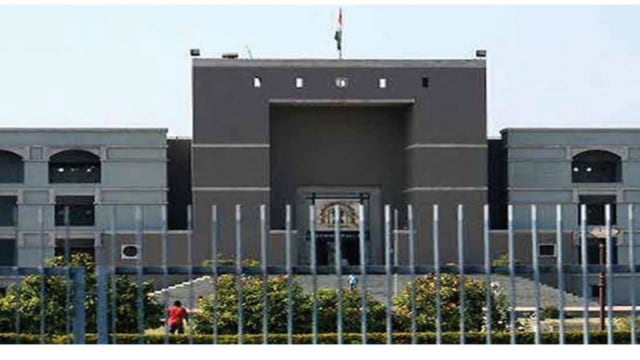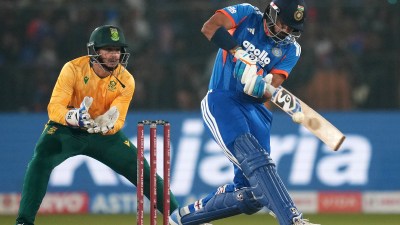16 years later, Gujarat HC sets aside govt order to compulsorily retire judge: ‘Likelihood of bias’
The court said that if the petitioner is found to be entitled for promotion as district judge, the effect of the promotion shall be given from the date on which the other incumbents who participated in the same exercise were promoted.
 The court also held that the petitioner would be entitled to retirement benefits and the pension should "be re-fixed by revision of the last drawn salary by granting the above directed benefits to him being a member of continuous service until the date of superannuation".
The court also held that the petitioner would be entitled to retirement benefits and the pension should "be re-fixed by revision of the last drawn salary by granting the above directed benefits to him being a member of continuous service until the date of superannuation".
The Gujarat High Court has set aside a 2009 order of the state government to compulsorily retire a then additional district judge, consequential to a decision of the Full Court, pointing out that it was not “bona fide” or in “the public interest”.
The court granted relief to the petitioner – the former judicial officer M S Shaikh – by directing the authorities to consider his entitlement to salary and benefits “as if he was in continuous service, without any break” until achieving the age of superannuation in 2014.
The court said that if the petitioner is found to be entitled for promotion as district judge, the effect of the promotion shall be given from the date on which the other incumbents who participated in the same exercise were promoted.
Stating that the decision-making process (to prematurely retire the judge) was “tainted” due to “reasonable likelihood of bias”, the judgment, pronounced by a Division Bench of Chief Justice Sunita Agarwal and Justice DN Ray on October 9, said the compulsory retirement “cannot but be said to be an order of punishment.”
M S Shaikh, who was then posted as additional district judge in Sabarkantha district, moved a petition in 2010 to quash and set aside a May 2009 notification of compulsory retirement and sought reinstatement to his original post as well as quashing of a departmental inquiry initiated in 2008– which was withdrawn by the HC after the decision on compulsory retirement in 2009.
Earlier, in 2008, he also moved the HC seeking quashing of a communication of the Registrar (Recruitment) informing him that the result of a promotion exercise conducted for the post of district judge had been “kept in a sealed cover in view of the departmental inquiry initiated against him” and sought directions to be entitled to the said promotion at par with other officers of the 1996 batch posted as assistant judges.
Shaikh, who had completed 55 years of age at the time of the assessment of performance, contended in his petition that the order of compulsory retirement on the basis of the departmental inquiry of 2008 is “penal” in nature. The departmental inquiry was initiated on the allegations of misconduct attributed to the judicial awards passed by him under the Motor Vehicles Act. The petition added that “not a single adverse entry” was made against the petitioner in the past service record and the premature retirement “cannot be said to be in the public interest.” It also contended that the authorities deciding the case had “failed to form requisite opinion, which may be subjective satisfaction”. The petitioner contended the exercise suffered from “malice in law” as even before he could submit his statement of defence in reply to the chargesheet of the departmental inquiry against him, the compulsory retirement order was passed and the departmental inquiry was subsequently withdrawn.
Hearing the submissions from both sides and considering precedents from the Supreme Court, the High Court deliberated on the principles of bias and also noted an affidavit filed by the Deputy Registrar of the HC in May 2010, which cited the confidential records of the petitioner that were taken for consideration by the Committee. As per the affidavit, the reports included, “…a record related to the departmental inquiry initiated against the petitioner as per the charge-sheet dated December 19, 2008 for various charges such as making excessive awards in MCAT cases, disbursing large amount of compensation to the widows and minors and using intemperate language in the judgments, service record of the petitioner including vigilance complaints.”
The report also included judicial observations in 2006 by a Division Bench (in appeals of two cases decided by the petitioner), which were communicated to the petitioner with instructions that the same shall be kept in mind… when such discretion is to be exercised in the future.”
Stating that the castigating remarks against the petitioner in the order of July 17, 2006 acted as a catalyst at three levels by three committees and bodies of the HC, The court order states, “In the instant case, the learned judge who was also honourable senior member of the Review Committee made certain castigating remarks on the judicial working of the petitioner and the judicial order passed by him on the interim application in the pending First Appeal against the award passed by the petitioner as a Motor Accident Claims Tribunal, was very much part of the record placed before the Review Committee…”
The court also considered that the “judicial observation in the order passed by the learned member of the Committee, who formed part of not only the Standing Committee but also the Full Court, is sufficient for the petitioner to establish the case of a reasonable possibility of bias…”
The court also considered the petitioner’s submission that although there has been a remark doubting his integrity, there has been no adverse entry regarding the same in any material on record. The adverse remark about “doubtful integrity” was not communicated to the judicial officer, as per his petition.
The court order states, “…once we find that the secret notes about the integrity in the ACR are missing in the original records and the only entries made in the column of integrity could not have formed the basis to record the integrity of the officer being doubtful… The impugned order of compulsory retirement though innocuously worded, but is in fact an order of removal of the petitioner from service…”
Stating that the “whole exercise of evaluation of the material… service record of the petitioner by the Review Committee had not resulted in a bona fide decision taken in the public interest”, the order states that the decision would be “vulnerable in the eyes of a reasonable man of ordinary prudence.”
Granting relief to the petitioning judicial officer, the court directed that since the petitioner achieved the age of superannuation in 2014, during the pendency of the proceeding, and since he “has been deprived from continuing in service after 19.05.2009, as a result of the illegal exercise of power by the High Court, he is held entitled to all consequential benefits including arrears of salaries, allowances, etc. upto the date of superannuation, i.e. 01.03.2014, as if he was in continuous service, without any break.”
The court also held that the petitioner would be entitled to retirement benefits and the pension should “be re-fixed by revision of the last drawn salary by granting the above directed benefits to him being a member of continuous service until the date of superannuation”.
The court order states that a decision to revive the withdrawn 2008 departmental inquiry against the petitioner is “left open to be taken by the HC on the administrative side” and the consequential benefits granted as part of the relief of the present order would be “subject to the result of the departmental inquiry”. The court order adds that if the HC decides not to proceed with the 2008 departmental inquiry, then the “sealed cover of the result of the promotion” declared in July 2008 is “to be opened and the resultant effect is to be given as per the recommendation of the (recruitment) Committee.







